LATEST NEWS
I don’t know about you, but I love public parks. City parks for hiking, little league, and summer concerts. State parks for camping. National parks like the Grand Canyon to experience the awe of nature. Parks are some of our most precious public assets.
But only if they remain public. This week, candidates in Kentucky’s gubernatorial election suggested that the state could privatize parks to raise revenue. That’s a misguided solution to the wrong problem: the state’s failure to invest enough in essential public assets. Advocates of privatization say the private sector will attract more tourists. But that would jeopardize the central mission of public parks to provide affordable access to nature and recreation. Parks managed by companies, like other private assets, will need to generate profit—funds that should be spent on maintaining and improving them.
The citizens of Kentucky aren’t alone. To manage the 14 million acres of state park lands in the U.S.,
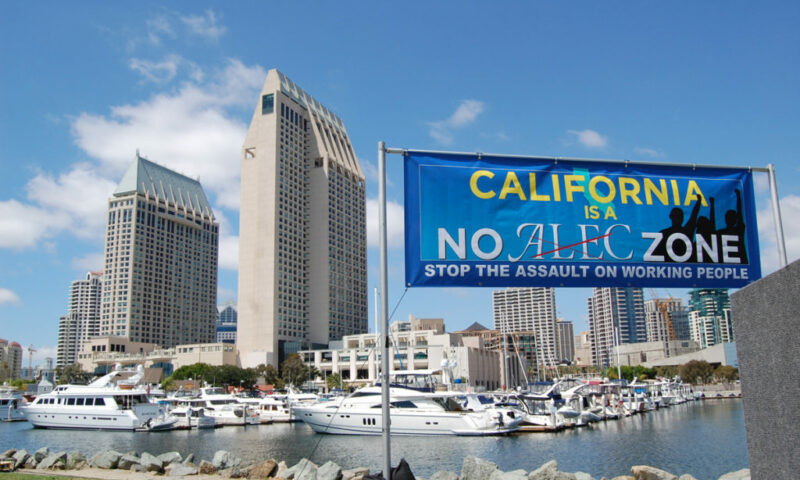

As lobbyists and state legislators gathered at San Diego’s Grand Hyatt resort last week for the three-day annual meeting of the American Legislative Exchange Council (ALEC), the delegates seemed to barely glance at the several dozen exhibitor tables that made up a sort of carnival sideshow of right-wing groups outside the hotel’s second-floor warren of meeting rooms.
Convention attendees had more pressing concerns. Namely, turning this year’s corporate wish list into the infamous boilerplate bills known as “model laws” that would aspire to undermine things like health and environmental standards, worker rights, campaign-spending limits and implementation of the Affordable Care Act (ACA) across the 50 states.
See more of our coverage of the ALEC Annual Meeting
Many of the exhibitor booths were occupied by familiar ALEC friends, such as the collection of extreme-right think tanks known as the State Policy Network,
…mill hands, farm hands, factory hands…hands….hands…hands…
— Eugene Debs
Ironworker Devonte Merrifield makes sure he takes care of his hands. He jokingly points out that the strength of his marriage depends on two strong – and sometimes soft – hands. “My wife complains because I can’t rub her back anymore because of my calluses. My hands can be a little rough,” he says, lifting his hands and smiling.
Merrifield is in some ways similar to my electrician father who believed that the feel of a person’s hands might indicate something about their character. Shaking my father’s hand was not merely a polite ritual. The absence of thick pads of calluses was, for him, one indication that you might not be contributing much to society.
Merrifield knows that what he does with his hands is deserving of a measure of respect. His identity is partly bound up with what he calls his “working man’s” hands and the confidence drawn from meeting the challenges of apprenticeship.

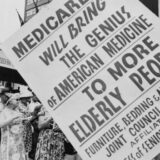
Fifty years ago this month, on July 30, 1965, President Lyndon Johnson signed into law an amendment to the Social Security Act that established Medicare, providing health insurance to people 65 and older regardless of income or medical history, and dramatically changed the landscape of senior health care for the better. As we celebrate this important anniversary, all of us should take a moment to consider how Medicare, the nation’s most successful and efficient health insurance program, continues to protect millions of seniors who might otherwise live without adequate health care or who might face bankruptcy because of medical bills.
As Medicare has been weaved into the fabric of our society, it’s hard to fathom a time when America placed its aging population at such risk, but prior to Medicare only 50 percent of Americans 65 and older had health insurance, and more than a third lived in poverty.
» Read more about: Celebrating Medicare’s 50th by Ensuring Medicare for All »


When Medicare was signed into law on July 30, 1965, nearly half of Americans over 65 had no health insurance, and many more lacked adequate coverage. Today, only 2% of senior citizens in the U.S. are uninsured. To celebrate the success of Medicare and rally for universal expansion of the program, events are being held in more than 2 dozen cities across the country.
The Los Angeles version will predictably have strong entertainment. There will be musical performances by Lili Haydn, who’s been called the “Jimi Hendrix of the violin,” along with Latino Hip-Hop group the Inner City Dwellers and musical parody group Billionaires for Wealthcare.
Also on the program are actor Mike Farrell of M*A*S*H, Richard Montoya of the performance troupe Culture Clash, State Senator Holly Mitchell, L.A. County Supervisors Sheila Kuehl, Hilda Solis, and Mark Ridley-Thomas, Dr.
» Read more about: This Thursday: Medicare is Having a Birthday Party »


Earlier this month, in yet another win for local control, leaders in one central Florida county rejected a proposal from a for-profit library management company to take over their public library. The company, Library Systems & Services (LSSI), operates at least 80 public libraries across the country, but Marion County joins a growing list of municipalities that realized that LSSI’s claim to do more with less while still making a profit was a greater fiction than even Stephen King’s best stories.
In 2010, the chief executive of LSSI admitted to the New York Times that the company saves money by cutting overhead and replacing unionized employees. “Cutting overhead” can mean fewer services and reduced hours. Privatized libraries make up for less professional staff by depending on unpaid volunteers and automation. Of course, when outsourcing relies on cutbacks in wages and benefits to realize savings,
» Read more about: Calabasas and Other Towns Reject Privatized Libraries »


If you take your kids to the beach this summer, expect a gritty ride home. California has turned off most of the showers that people use at state beaches to clean the sand off their kids before the long ride home. Then, of course, you get to clean the sand out of your car. All this aggravation saves about 18 million gallons of water a year, according to the state.
In a drought like this one, it makes sense to conserve as much water as possible, wherever we can. So you would think we would be trying to stop some big water users too. Like Chevron. This mega-corporation sells 21 million gallons of treated polluted water a day to the Cawelo Water District, which, according to the Los Angeles Times, provides water to 90 Kern County farmers.
Where Chevron gets the water,
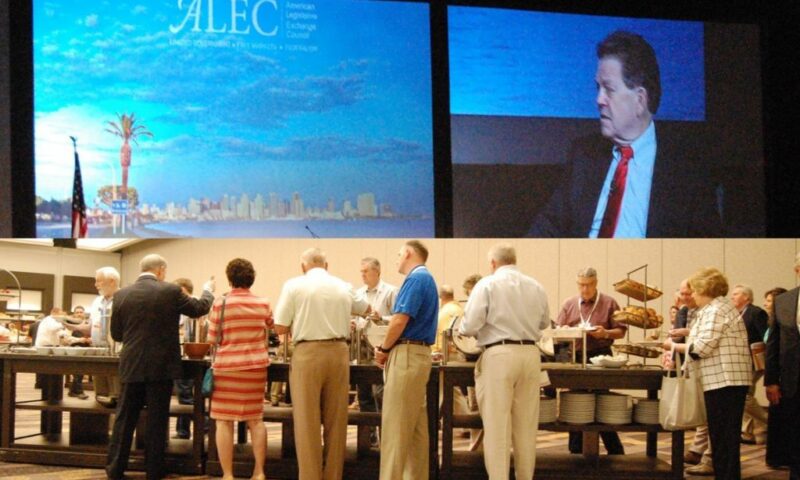

“The biggest scam of the last 100 years is global warming!” thundered Stephen Moore to ALEC’s plenary breakfast club this morning. “It’s no surprise that when you give these professors $10 billion, they’re going to find a problem.” Moore then singled out North Dakota for its regulatory-free attitudes toward the fracking industry: “I just have one message for you — drill, baby, drill!”
See more of our coverage of the ALEC Annual Meeting
The annual meeting of the American Legislative Exchange Council began wrapping up business in San Diego Friday on this defiant note from Moore, a former Wall Street Journal writer. This newly hired Heritage Foundation economist is an apostle of completely eliminating state income taxes and has been in a running feud with liberal economist and New York Times columnist Paul Krugman, over Moore’s casual regard for accurate reporting.
Moore’s speaking partner today was fellow supply-sider Arthur Laffer,
» Read more about: ALEC Confidential: Tales from the Supply-Side »
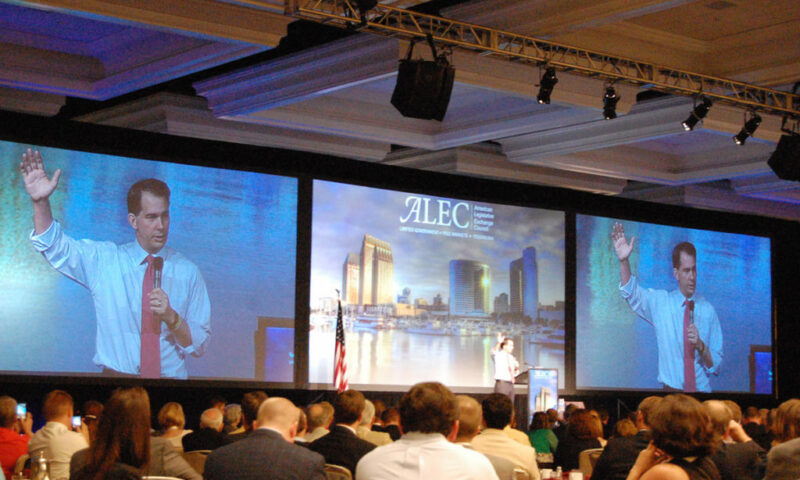
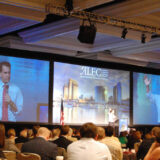
Scott Walker couldn’t have asked for more.
When the Wisconsin governor took the dais Thursday at the American Legislative Exchange Council’s annual conference in San Diego, his audience was ravenous for any vision that included destroying unions and cracking down on America’s criminal underclass.
See more of our coverage of the ALEC Annual Meeting
The venue was the plenary croissants-and-eggs breakfast, but it would be hard to imagine an audience hungrier for the red meat Governor Walker threw out to it.
Every key bill Walker has been associated with, since his get-tough-on-crime heyday as a state assemblyman in the 1990s, has been a plagiarism of an ALEC model bill. Such as laws that eliminated parole (and ballooned state prison populations) or that imposed a voter ID law, gutted public education and teacher protections, and made Wisconsin the 25th right-to-work state.
Walker himself isn’t an actual member of the secretive corporate lobbying network (ALEC only admits legislators,
» Read more about: ALEC Confidential: Scott Walker Talks the Walk »
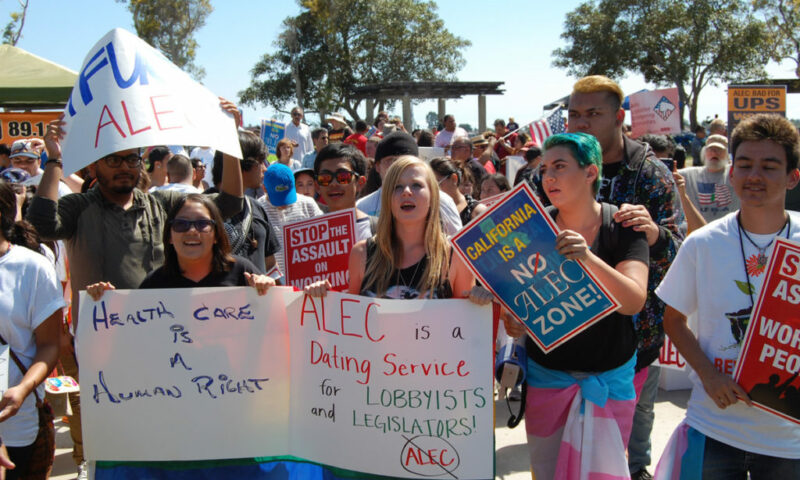

For several tense hours yesterday San Diego’s plush Manchester Grand Hyatt hotel, located in the city’s Embarcadero district, felt more like Athens’ besieged Parliament than a resort on California’s laid-back shoreline.
Around 2 p.m. the hotel, which is playing host to this year’s annual meeting of the American Legislative Exchange Council (ALEC), sealed off all entrances except its main lobby in what became a virtual lockdown.
See more of our coverage of the ALEC Annual Meeting
For the 1,300 state legislators and corporate lobbyists gathered inside, the perceived security threat turned out to be from those who stand the most to lose from ALEC attacks on workplace rights, minimum wage laws and state health and environmental standards — California workers.
An estimated 2,500 protestors, carrying placards declaring California to be an “ALEC-Free Zone,” gathered around 1 p.m. in Embarcadero Marina Park to hear a series of speakers lambasting the secretive,
» Read more about: Labor Rally Sends ALEC Conference Into Lockdown Mode »
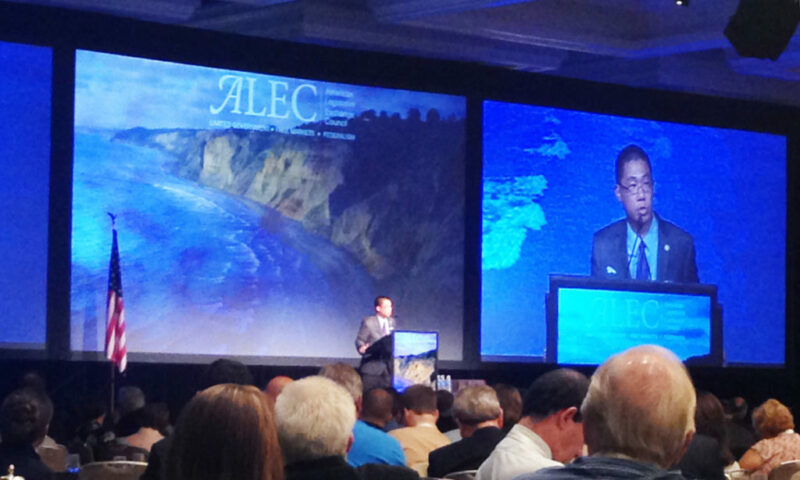

The 42nd Annual Meeting of the American Legislative Exchange Council (ALEC) got underway in earnest Wednesday at San Diego’s Manchester Grand Hyatt resort hotel. The mood was convivial and the attire corporate casual: Brooks Brothers suits without ties, Dockers and sports shirts.
Although this year’s star attractions — a GOP presidential frontrunner, Wisconsin Governor Scott Walker, and a returning presidential contender, former Arkansas Governor Mike Huckabee — weren’t scheduled to speak until Thursday, conference delegates had plenty to do yesterday.
The packed opening luncheon featured Iowa’s virulently anti-immigrant Congressman, Steve King.
ALEC, a secretive rightwing bill mill that gets its funding from the Koch Brothers and global multibillion dollar corporations, has been described as a legislative dating service that arranges hookups between mostly Republican state lawmakers and corporate lobbyists.
See more of our coverage of the ALEC Annual Meeting
The actual “dates” occur at meetings like those unfolding in San Diego — a council spokesperson said 1,300 conferees were in attendance — and take place behind locked doors,
» Read more about: ALEC Confidential: Inside the San Diego Conference »


Texas law enforcement officials may or may not have murdered Sandra Bland in her jail cell earlier this month, three days after her arrest during a routine traffic stop. At a Monday press conference, Waller County District Attorney Elton Mathis – who is charged with investigating Ms. Bland’s death – implicitly blamed the victim: “Sandra Bland was very combative. It was not a model traffic stop. It was not a model person that was stopped.”
We’ve heard this before, especially in response to police killings of African Americans. Michael Brown, killed by Ferguson police, was “no angel.” Freddie Gray, killed in Baltimore, was “no saint.” Former altar boy Patrick Dorismond, killed by the NYPD, was “no altar boy.” Oscar Grant, Trayvon Martin and countless others have been similarly described, as though this is a mitigating – or worse,
» Read more about: Sandra Bland and Toeing the Thin Blue Line »


The line of people standing outside the event in downtown Los Angeles snaked out the door and down to a sidewalk—but there were no velvet ropes and it wasn’t at Nokia Center or L.A. LIVE. The venue was the Kenneth Hahn County Hall of Administration.
The hundreds who waited Tuesday morning in muggy heat had come to weigh in on a measure before the Board of Supervisors to increase the minimum wage in L.A. County’s unincorporated areas.
Perla Lagunas and her kids traveled from North Hills in the San Fernando Valley to show support. “I represent a low-income community,” she said. Her mother was a garment worker who struggled with bills and groceries. “My mom worked with people who wouldn’t pay her a good wage. We grew up so poor– sometimes we didn’t have food. We want to let the community know—wake up!”
Representatives from the National Council of Jewish Women stood in line to enter the hearing.


Steven Luftman did not have much to feel good about last Tuesday as he stood in the TSA line before catching a flight from Sacramento to Los Angeles. After all, he was in the process of being evicted from his Fairfax District rental under the state’s Ellis Act, a law that speculators often use to kick out longterm renters from their homes in order to redevelop a property for higher profits. But then Luftman realized who he was standing behind: Matthew Jacobs, the man responsible for his eviction.
Hours before, the two had squared off during the July 14 meeting of the California Housing Finance Agency (CalHFA) in which Jacobs, an agency chairman who had been facing mounting criticism for his efforts to evict dozens of tenants who live in complexes in Los Angeles’ Beverly Grove and Fairfax neighborhoods, announced he was quitting the agency.
“He was right in front of me —
» Read more about: Demolition Man: Developer Matthew Jacobs Quits Housing Agency »


The town of Coatesville, Pennsylvania, outside of Philadelphia, is a former steel mill town full of struggling residents. With a per capita income of $14,079, Coatesville is situated in wealthy Chester County, but it has struggled amid a declining population and lack of job opportunities. Missoula, Montana, on the other hand, was once a thriving lumber town. Its per capita income of $17,166 means it’s slightly wealthier than Coatesville, and the University of Montana and two hospitals are major employers for the city.
Two thousand, three hundred miles separate Coatesville from Missoula, but the two towns have more in common than you might think. One important similarity? Their ongoing struggles with private, for-profit water companies, like too many cities around the U.S.
Coatesville officials sold the public water utility in 2001, hoping to use the one-time cash infusion to spark an urban renaissance while the privately-run PAWC promised to invest in desperately needed modernization and maintenance.


When Democratic former San Jose mayor Chuck Reed and Republican ex-San Diego councilmember Carl DeMaio finally unveiled the language for a promised attempt at getting a statewide public pension cutting measure to 2016 voters, the expectation was that Reed II would be a reined-in and more realistically-framed version of Reed I – last year’s failed attempt at undermining the public pension system.
That try for the 2014 ballot was aborted after Attorney General Kamala Harris slapped it with a candid, albeit politically untenable summary that frankly described the proposed constitutional amendment as targeting longstanding legal rights—rights that protect the pensions and retirement health care of the 1.64 million Californians enrolled in the state’s public pension systems.
But even veterans of the state’s public-sector retirement wars were unprepared for the sheer scale of what awaited them this time around.
» Read more about: Measure of Deception: CA Initiative Would Gut Retirement Benefits for Millions »


Edward Navales realized a career in large tech firms wasn’t for him, and in 2008 he decided to open his own business. Armed with a University of Texas MBA and guided by a desire to do something meaningful, he decided to start a firm in the health care sector. As he surveyed his options, it seemed like a franchise agreement would be the quickest and surest way to success.
He invested savings, took out a Small Business Administration loan and entered into an agreement with Bright Star Healthcare, a small but fast-growing home health care company. Bright Star promised its franchisees support and flexibility. According to Navales, the reality was something else entirely.
“What I found was inadequate support, unrealistic and predatory minimum sales targets and costly vendor requirements,” Navales said. “I soon learned my fellow franchisees were experiencing the same challenges.” Bright Star, claimed Navales, wasn’t responsive to their requests and complaints,
» Read more about: Step Back, Big Mac: California Franchisees Score Major Victory »
As rental prices skyrocket in Los Angeles, landlords are increasingly kicking out long-term tenants to clear the way for more affluent residents. Lovell Estell III’s story last May about the bittersweet end of Catherine Green’s 30-year tenancy at the Boulevard Villa apartment complex profiled one such case. When she was a child, Green and her family left Jim Crow Texas for the freedom Los Angeles offered. She became a successful businesswoman and homeowner, but this year, at the age of 90, she received an eviction notice. Forced, along with all her fellow tenants, to leave her Crenshaw Boulevard home, and unable to rent in an increasingly expensive Los Angeles, Green returned to the South.
» Read more about: Video: Skyrocketing Rents Driving Long-Time Residents Out of L.A. »
By now, you have probably heard about the riot at the for-profit Kingman Prison in Arizona. Days of unrest at the prison, run by the privately-held Management Training Corporation, left 15 wounded and forced nearly 1,000 incarcerated people to be transferred to other facilities. The same facility also suffered from a major riot in 2010. Similarly, people detained at an MTC-run camp in Texas names Willacy rioted earlier this year, forcing that facility to close completely.
The Kingman riots are focusing renewed attention on the Arizona legislature’s long, cozy relationship with the private prison industry. The repeated failings of for-profit prison operators have led Arizonans and the editorial board for the state’s largest paper to ask some big questions:
» Read more about: Questions Surround Private Prisons After AZ Riot »


Hopes were high among environmentalists when a bill designed to protect California’s drinking water was introduced in the state Assembly earlier this year. After all, California has passed some of the most far-reaching environmental laws and regulations in the nation, and the state legislature is dominated by the Democratic Party, whose members are generally inclined to vote for tougher environmental standards. Moreover, California is in the midst of a massive drought, which gave the bill more urgency. And besides, clean water isn’t a threatened desert flower or endangered minnow – it’s something everyone depends on for existence.
It never had a chance.
The measure, Assembly Bill 356 (Das Williams, D-Carpinteria), was intended to protect underground sources of drinking water from oil and gas wastewater disposal and enhanced oil recovery treatments, and called for monitoring near certain injection wells. That immediately put it in the crosshairs of the most powerful oil interests in California,
» Read more about: How Democrats Mixed Oil and Water, Killing Environmental Bill »